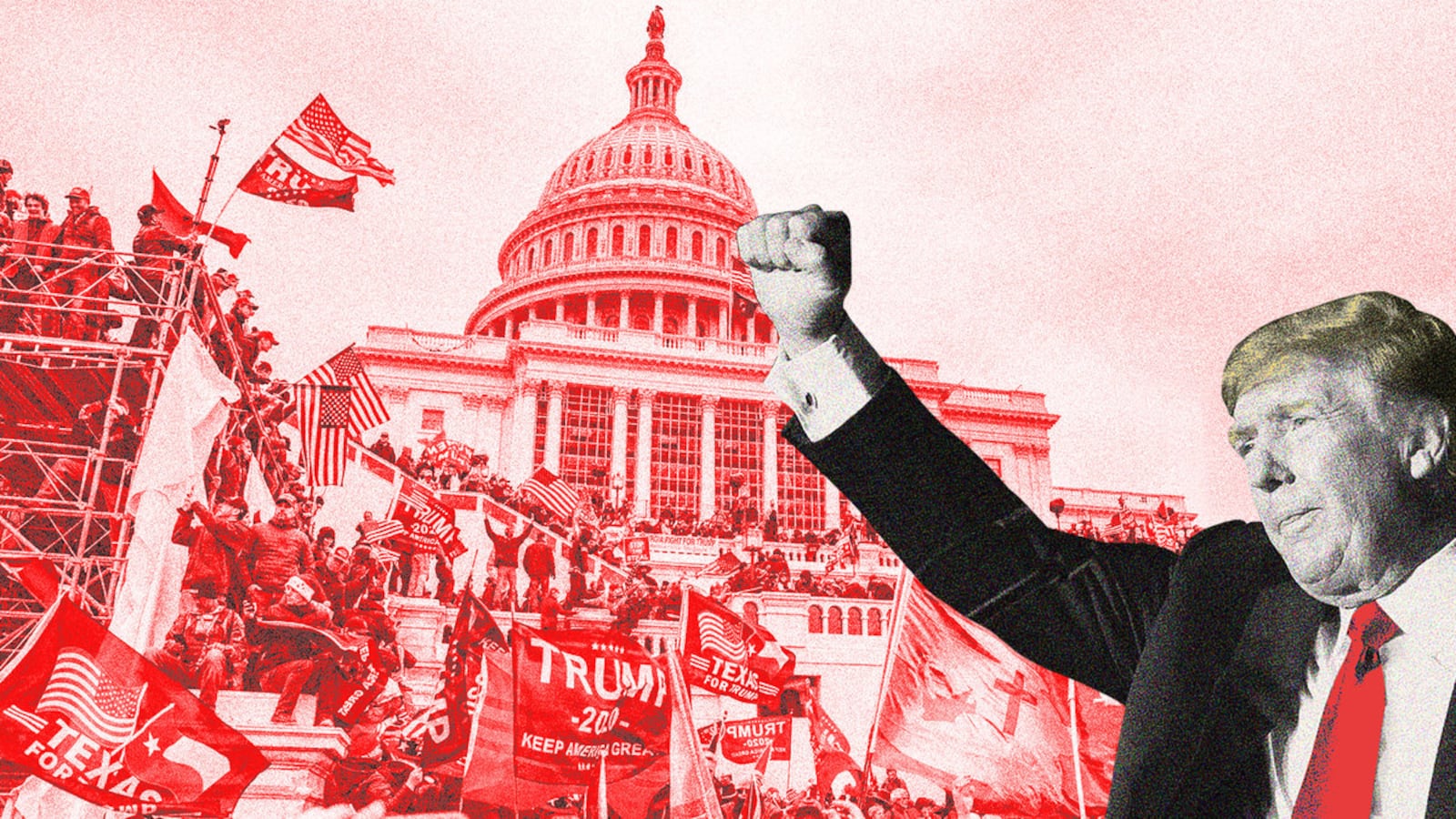Donald Trump will never stop reminding us of how dangerous a prospect another four years of him in the White House would be. (If only he had been impeached, convicted, and barred from office over inciting a riot!... Oh, wait.)
"If I run and if I win, we will treat [the Capitol rioters] from January 6 fairly. We will treat them fairly," Trump declared at a rally in Texas on Saturday night. "And if it requires pardons, we will give them pardons. Because they are being treated so unfairly."
On Jan. 6, some of the horde that ransacked the Capitol justified their behavior by declaring, “Our president wants us here.” In floating the possibility of pardons, Trump reaffirms their belief that they were doing his bidding.
To be sure, Trump accidentally made an important point about “treating them fairly.” As it’s unlikely the 45th president will ever pay any legal price for inciting a riot that temporarily halted Congress’ certification of the election, it hardly seems fair for his ground troops to be punished for following his orders. Indeed, the lesson many are likely to take from the whole Trump presidency could be summed up in Nixonian terms: “When the president does it, that means that it is not illegal.”
Speaking of Nixon, if it wasn’t clear before this weekend, it should be now: Donald Trump’s presidency makes Watergate look tame.
Watergate, in hindsight, was a botched “third-rate burglary,” that turned into an attempted White House coverup. Trump’s presidency, in contrast, involved numerous impeachable offenses, two actual impeachments, several serious attempts to strong-arm officials into “overturning” the 2020 election, and (lest we forget) the denouement: the incitement of an attempted insurrection.
And yet, the outcomes are very different. Watergate toppled a president and sent several of his top men to jail—including chief of staff H.R. Haldeman, assistant in charge of domestic affairs James Ehrlichman, and White House Counsel Chuck Colson (among others).
It took them a while, but by the time Nixon resigned, Republicans—both in office and to a large extent, in the general population—were ashamed and appalled by Watergate. Though Nixon was later pardoned by his successor, President Gerald Ford, there were real consequences for his actions.
By contrast, Trump’s attempt to overturn the 2020 election results has been generally dismissed or defended by Republicans. And about 70 percent of Republican voters incorrectly believe the 2020 election was either “definitely” or “probably” illegitimate.
Rather than being forced (as Nixon was) into the political wilderness, and his party plunged into a deep-cleanse of soul-searching, Trump remains the most likely GOP nominee for president in 2024. Meanwhile, most of his accomplices have either completely skated or were pardoned by him. In the event Trump is re-elected in 2024, the people who rioted in the Capitol, threatened to “hang Mike Pence,” and attacked police officers will likely be pardoned, too.
Consider the moral hazards. Such an action would send a clear signal that raw power, rather than the rule of law, is what matters—and that defeated presidents get one free shot at attempting a coup.
Watergate hastened some wide-ranging “good government” ethics reforms. But arguably more importantly, it chastened a generation of political staffers and operatives. This is not to say that there won’t always be very many skeevy, bad actors plumbing the depths of D.C. politics, but post-Watergate you always knew that if you crossed the line, there would be a price to pay. You might be humiliated. You might be fired. You might even do time.
Trump’s attempt to steal the 2020 election failed because enough people close to the levers of power—advisors, staffers, bureaucrats, etc.—thought better of it. This is partly because (a) some were law-abiding patriots who value the Constitution, and (b) some feared there would be ramifications for breaking the law.
Nixon didn’t have some of the advantages Trump has enjoyed, such as a major cable news outlet dedicated to supporting him and an army of disinformation propagandists on the internet. Worse still for Tricky Dick, the GOP of 1974 still had the capacity for shame, as well as the courage and will to hold powerful people accountable.
If Trump and his accomplices go scot-free, future staffers and bureaucrats may well reason that “just following orders” is the path of least resistance. If Trump were president again, and he follows through on his pardon pledge, what would be the disincentive for any of his supporters considering political violence?
Think about this way: Trump is still inciting his supporters and dehumanizing his political adversaries.
Although it received less attention than his other remarks this weekend, Trump’s speech Saturday night also featured criticism of the New York State attorney general, the Manhattan district attorney, as well as Fulton County (Georgia)’s district attorney, all of whom are investigating him. Trump urged supporters to organize protests against them, saying, “These prosecutors are vicious, horrible people. They’re racists and they’re very sick. They’re mentally sick....”
This isn’t normal political rhetoric, and we’ve already seen the folly that was “Take Trump seriously, but not literally.”
That’s why justice needs to be served for the crimes committed. Someone needs to go to jail. Someone has to pay.








